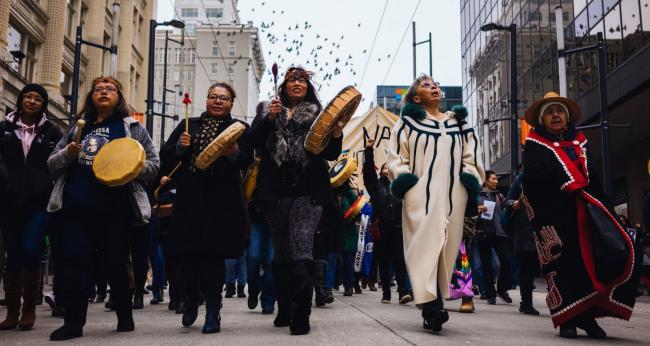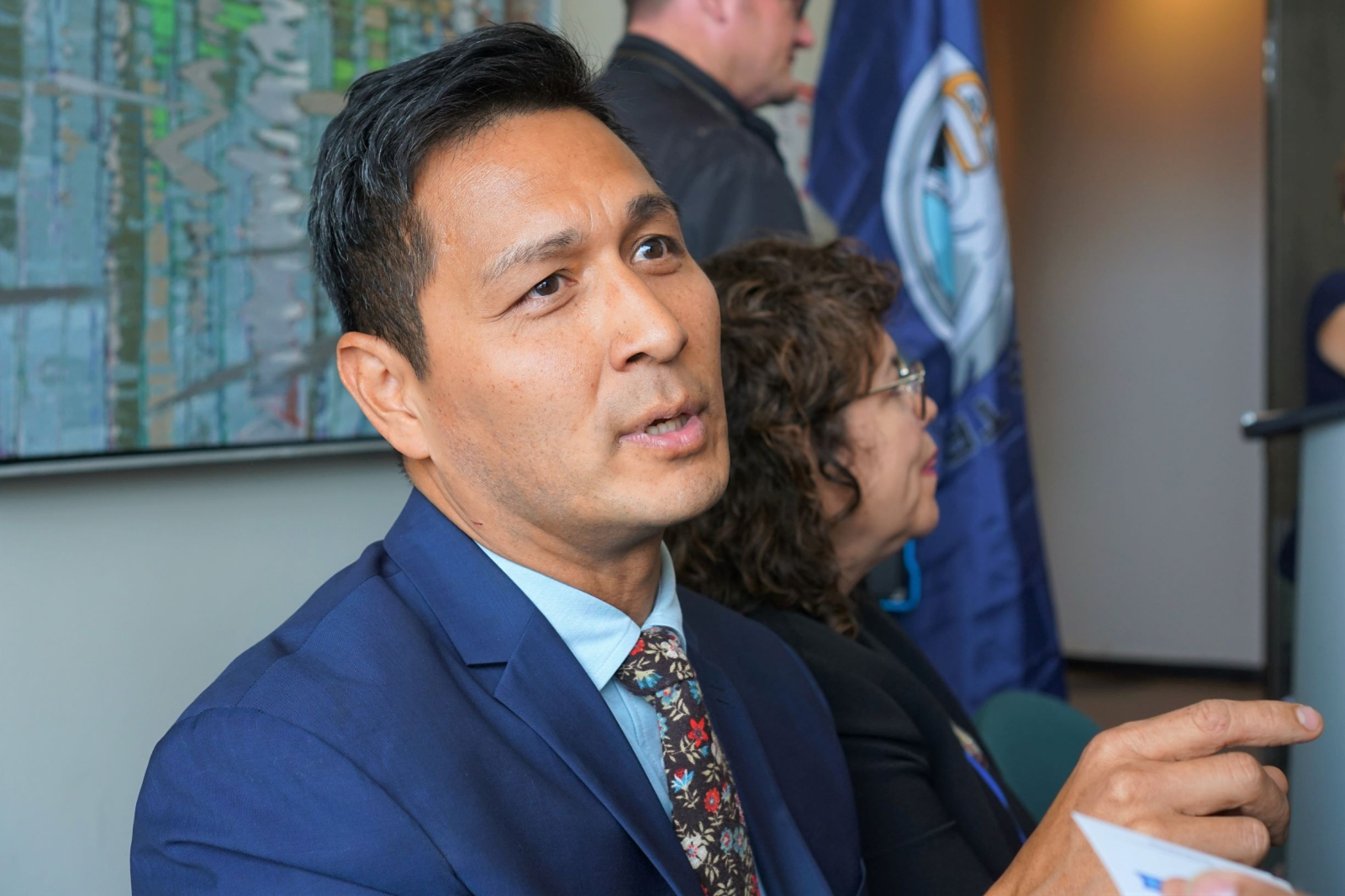 YouTube @YouTube
YouTube @YouTubeArticles Menu

Nov. 8, 2019
Shiri Pasternak suspected corporations likely won more injunctions than First Nations did in land disputes.
But she was shocked after she and her fellow researchers began crunching numbers.
The team at Yellowhead Institute, an Indigenous-led think tank, reviewed nearly 100 injunction cases. They found corporations succeeded in 76 per cent of injunctions filed against First Nations, while First Nations were denied in 81 per cent of injunctions against corporations.
Similarly, First Nations were denied in 82 per cent of injunctions filed against the government.
The findings were published in a Yellowhead report, called Land Back.

“What we found was even more shocking than we could have imagined,” Pasternak said of what she called “astronomically high” numbers for corporations and governments and “absolutely dismal success” for First Nations.
A small team of researchers at Yellowhead pored through cases across the country, set research parameters (for example, they focused on First Nations instead of Inuit and Métis) and variables and had 10 people conduct a peer review on the methodology.
They concluded the data shows that the court system is skewed toward seeing value and harm in economic terms opposed to Indigenous people asserting their rights and their laws.
For those who can't sleep tonight, my video on the RCMP raid on Gidumt'en territory: https://youtu.be/2oand_gk59o
Pasternak meant both Indigenous law and state law. She gave an example with the injunction Coastal Gaslink filed against the Unist’ot’en camp in Wet’suwet’en Nation in January. The camp was controlling access to their territory and blocking access for Coastal Gaslink workers. The Gidimt’en clan also put up a gated checkpoint after the company was granted an injunction. The pipeline project breaks Wet’suwet’en law, as it never received consent from hereditary chiefs. The RCMP raided and destroyed the checkpoint and continue to enforce the injunction. Pasternak said the raid also broke state law according to Delgamuukw v. British Columbia, a landmark Supreme Court decision in 1997 that ruled Indigenous ownership of land has never been extinguished in British Columbia.
Filing an injunction is a very expedited process — so there is not much time to present the courts with extensive or complex evidence.
A party may file an injunction one afternoon and have a hearing the next day, said Sean Sutherland, an associate at Osler, Hoskin and Harcourt LLP in Calgary. The firm has represented Kinder Morgan and Enbridge, as well as renewable-energy companies and companies in other industries.
Injunctions are mostly done by affidavits and are meant to provide temporary relief in a matter of urgency. The party filing for the injunction must prove they cannot wait until a hearing for resolution.
Sutherland explained there are three tests in an injunction: whether it’s a serious issue; whether it may cause irreparable harm; and the “balance of convenience,” which means the court decides whether the party wanting the injunction or the party resisting faces the bigger risk of suffering harm.
He emphasized how the harm must be irreparable, and many injunctions are lost in court at that test.
“You can have very significant harm in terms of magnitude, but it’s still not irreparable,” he said, in which case the courts say the decision can wait for a final hearing.
Sutherland said he couldn’t comment directly on Yellowhead’s report because he had not looked at it closely enough, but added that when it comes to injunctions, every case is different.
Pasternak said economic harm is easier to prove quantifiably with numbers in an affidavit, as opposed to “a sacred area, moose den, fish spawning site or traditional territory.” She added that, ultimately, courts do not treat Indigenous law as equal.
Merle Alexander, a member and hereditary chief of Kitasoo Xai’xais First Nation and a lawyer at Miller Titerle and Company, agreed.

He said courts are “inadequate” at quantifying cultural and spiritual significance, and injunctions are not ideal forums to deal with the complexity of Indigenous rights and title. He said since injunctions are so rushed, courts often don’t have the time or ability to consider the weight of complex evidence.
“The burden of trying to present expert evidence on how five or six core rights might be affected often isn’t available to you in an injunction proceeding mostly done by affidavits,” he said. “The courts are such a blunt object to try and protect territories.”
Alexander also emphasized the heavy costs for First Nations to file and fight injunctions, and the time it would take to work with the province to create a resolution system outside the courts.
“To some extent, they’re too busy being reactive to any variety of complex issues that are happening in their territory — social issues that they need to manage,” he said.
And the court system available to them can cost hundreds of thousands of dollars for judicial reviews, let alone pushing a case to the Supreme Court. The Unist’ot’en camp said they have spent $400,000 on injunction proceedings and a judicial review.
When the Tsilhqot’in Nation went to the Supreme Court in 2014, it was a landmark victory that marked the first time in Canadian history the court declared Indigenous title to land outside of a reserve. But Pasternak points out that case cost more than $30 million.
“You really have this weaponized legal mechanism that preys on the economic inequality across society, where Indigenous people don’t have the resources to go to court all the time and assert their jurisdiction and rights against companies and governments with very deep pockets,” she said.
In another victory, the Tsilhqot’in Nation was granted an injunction against Taseko Mines Ltd., stopping the company from carrying out exploratory drilling near the lake Teẑtan Biny.

Pasternak said Yellowhead is now thinking about what to do with the research.
She said institutional change may need to be led by the attorney general and build off Jody Wilson-Raybould’s last directive in January, which called on prosecutors to prioritize negotiation over litigation in cases involving Indigenous Peoples.
She also said they are considering writing a submission to the UN’s committee on the elimination of racial discrimination to try and build a legal case around the harm injunctions have caused communities.
Alexander pointed out that in the 2004 case Haida v. British Columbia, the Supreme Court recommended a separate mechanism for mediation in B.C. The court said the province “may wish to adopt dispute resolution procedures like mediation or administrative regimes with impartial decision-makers in complex or difficult cases.”
He said establishing this kind of regime hasn’t been a priority — but now, B.C. has become the first province to implement the United Nations Declaration on the Rights of Indigenous Peoples (UNDRIP).
The declaration defends Indigenous Peoples’ right to maintain and strengthen their legal institutions and have those legal systems recognized by the state, and the right to “own, use, develop and control” their traditional territories.
The declaration also protects Indigenous Peoples’ right to “just and fair procedures for the resolution of conflicts and disputes with states or other parties.”
The bill requires all provincial laws to be aligned with the declaration, which Alexander said could include a new institution for mediation between the province and Indigenous Peoples.
“I think that will be key in the action plan to implement UNDRIP,” he said.
[Top photo: Indigenous leaders march on Jan. 8, 2019, in Vancouver, B.C. Rallies were held across Canada to show solidarity with Wet'suwet'en. Photo by Michael Ruffolo]